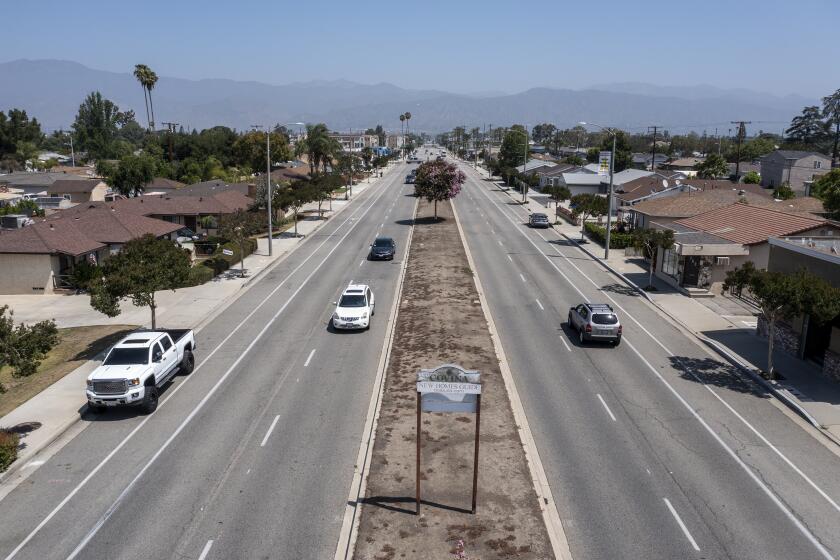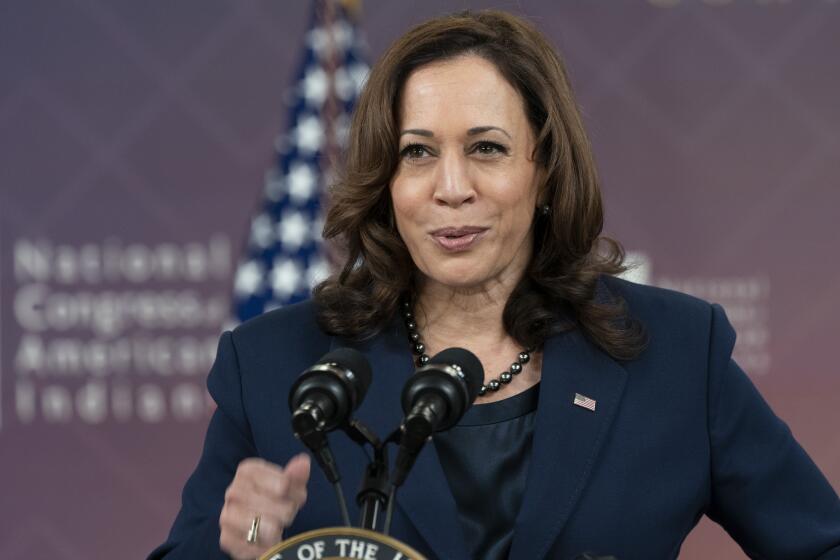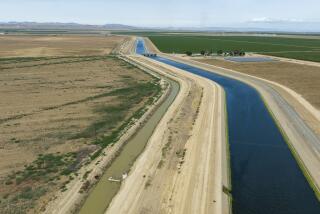Harris unveils White House plan to tackle water scarcity as national security priority

- Share via
WASHINGTON — Vice President Kamala Harris on Wednesday unveiled a White House plan to tackle water security as a foreign policy priority in light of ever tightening global water supplies.
The plan pledges U.S. leadership in the efforts to ensure there is enough water to support food supplies and healthcare systems. Under the initiative, the U.S. government will also spearhead ways to defuse potential disputes over access to water, Harris said.
Conflicts over water are becoming more common across the globe as supplies come under increasing pressure from climate change, urbanization and population growth. Research has shown that global warming is intensifying the water cycle, leading to more severe droughts and floods.
“Water insecurity makes our world less stable,” Harris said at the White House, noting water scarcity makes it more difficult for communities to produce food, protect public health and drive economic growth. “Many of our most fundamental national security interests depend on water security.”
According to the United Nations, about 2 billion people live in countries where water supplies are under high stress.
In many farming regions around the world, from India to California, groundwater is being depleted by heavy pumping, leaving declining water reserves in aquifers. Many areas of the world also lack adequate water infrastructure, with an estimated 2.2 billion people living without access to safe drinking water supplies.
The latest White House plan builds on other Democratic-led investments in water infrastructure in the U.S., including the $1-trillion bipartisan infrastructure law that included $63 billion in provisions to eliminate lead pipes, improve drinking water and support drought resilience.
As a “daughter of California,” Harris recalled her own experience growing up amid an extreme drought and watching the Oakland Hills landscape “turning from green to brown.”
“I remember how unsettling it was to imagine how our access to a resource so basic and essential as water, how that could become so uncertain,” she said. “It is a reality that more and more people in our nation are, however, experiencing and understanding this issue every day.”
She noted about 90 million Americans are living under drought conditions. By 2030, almost half the world’s population will struggle to meet their water needs, she said.
More than 6 million Southern Californians will be placed under new drought rules today in an unprecedented effort to conserve water.
Conflicts over water are on the rise internationally. The Pacific Institute, a think tank in Oakland, has been tracking water-related conflicts and has found an increase in violence over water resources. Droughts in India and Iran over the last few years, for example, have led to more conflicts over access to water. And water infrastructure has been targeted or damaged during fighting in Iraq, Yemen and other countries.
Vice President Kamala Harris will visit Lake Mead in Nevada on Monday to highlight the problems caused by the West’s dire drought.
Samantha Power, administrator of the U.S. Agency for International Development, pointed to Russia’s invasion of Ukraine as an example, with attacks on the country’s water supply leaving nearly 11 million Ukrainians without access to safe drinking water.
Limited water supplies have also become a growing challenge across the Western United States. Scientists have found that since 2000 the Western U.S. has endured its driest 22-year period in at least 1,200 years.
“Water scarcity is a global problem and it must be met with a global solution,” Harris said. “So today we make clear the United States will be a leader in the solution.”
More to Read
Get the L.A. Times Politics newsletter
Deeply reported insights into legislation, politics and policy from Sacramento, Washington and beyond. In your inbox twice per week.
You may occasionally receive promotional content from the Los Angeles Times.














